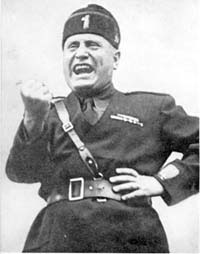
 |
 |
|
15-Mar-2004 |
|
If we delve further back, the roll call gets longer: the living and recently deceased Italian soldiers under Mussolini whose atrocities against Greeks, Serbs, Ethiopians and Jews have been, with U.S. approval, largely ignored for more than 60 years. One of the most notorious, Giovanni Ravalli, died only in 1998, fully exposed but completely unpunished for crimes ranging from having a Greek policeman's teeth pulled out with pliers to ordering boiling oil poured over 70 other prisoners.
John MacArthur, Sorry About That War Crime, Glove and Mail, 04-Aug-2001 www.commondreams.org/views01/0804-03.htm |
|
These "black holes" in the document and historiographical base correspond in interesting ways to gaps in Italian popular memory, as several fine oral history projects reveal. Italian atrocities committed in their Balkan and colonial territories, the more than fifty concentration camps throughout Italy that held Jews and foreigners during World War Two, the forced labor of Italian Jews in the cities and countryside � none of these events have much resonance at the level of individual recollection, even among those who witnessed or executed such policies and/or had quotidian engagements with those who were affected by them. Such local patterns of (non)recollection, which often remain unchallenged due to the continued inaccessibility of many communal and provincial archives, flow into national narratives that perpetuate the idea that the Nazis "were the only ones responsible for massacres, deportations, and violent behaviors." They sustain what the historian Ernesto Galli della Loggia has termed the "singular schizophrenia of [an] Italian public opinion" which remembers German atrocities on Italian soil and represses Italian atrocities against other peoples with equal tenacity.
Ruth Ben-Ghiat, A Lesser Evil? Italian Fascism in/and the Totalitarian Equation http://216.239.53.104/search?q=cache:m_p0qhHfbUkJ:www.sissco.it/attivita/sem-set-2003/relazioni/ben-ghiat.rtf+%22italian+war+crimes%22&hl;=en&ie;=UTF-8 |